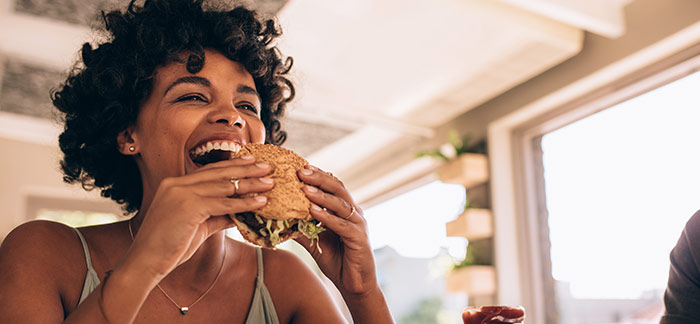
There’s emotional eating and there’s intuitive eating – and it’s better to listen to your intuition than your emotions if you want to live in a happy, healthy body.
Although the concept of intuitive eating is not new – dietitians Evelyn Tribole and Elyse Resch developed this self-care eating framework in 1995 – intuitive eating is gaining new fans in 2021 with its pragmatic and holistic approach to food.
But, just what exactly is it?
At its heart, it is a healthy way of living which involves your instinct alongside your feelings and common sense.
Above all, intuitive eating is not a diet, as it doesn’t impose rigid “do’s” and “don’ts”, or say when you may or may not eat, and it’s important to realise that it is also not primarily aimed at weight loss.
Rather, this approach to food teaches that YOU are the only person who can truly decide what your body needs, and you do this by paying attention to physical sensations and cues.
The first step towards intuitive eating is to recognise where you are even if you have an unhealthy relationship with food (and, by the way, if that’s you, you are more normal than you know!)
Many of us are “emotional eaters” who automatically reach for food to push away negative feelings.

We may feel bloated or ashamed after eating that whole slab of chocolate, or plate of hot chips doused in tomato sauce, and those negative emotions often boomerang and lead to a vicious cycle of binge eating and – most likely – weight gain.
However, who wants to fight with food all the time, feel guilty, or full of cravings?Intuitive eating instead teaches you how to be at peace with what, when and how you eat.
At more serious levels, emotional eating can lead to eating disorders like bulimia, and studies have shown that intuitive eating can be helpful in fighting disordered ways of eating.
Tribole and Elyse Resch have 10 key principles to this way of approaching food:
- Reject the diet mentality – so ditch that latest fad diet, no matter how fab your friends say it is, and read up about good nutrition.
- Honour your hunger – it is your body’s way of telling you to refuel, preferably with healthy fuel.
- Make peace with food: it is not your enemy, our bodies need food to survive and thrive.
- Challenge the food police and let go of the judgemental attitude. You are not on trial if you sneak in an unhealthy snack now and then! If you feel like fries with ketchup, then enjoy – just don’t make it your only food choice (remember points 1-3!).
- Discover the satisfaction factor: food is one of life’s simple pleasures so give yourself permission to enjoy eating. If you are not hungry, though, there is no need to force yourself to eat according to the clock. As you practice intuitive eating more regularly, you will learn to recognise when your body is hungry, and when it is full.
- Feel your fullness: give your body the chance to feel full, so take your time and don’t wolf down everything at once.
- Cope with your emotions with kindness: don’t automatically numb feelings such as anger, anxiety or even boredom with food. Emotional eating (the opposite of intuitive eating) can be linked to eating patterns that are out of sync with what your body really needs.
- Respect your body: it may not be perfect, make peace with it because it gets you through life so be more accepting of its so-called flaws.
- Movement: exercise because you like it, not because you think you have to. So if you are only jogging because you want to lose weight and actually hate it, rather choose some other kind of movement that gives you joy.
- Honour your health with gentle nutrition.
Over and above these points, cultivate a supportive environment. This final point may be key at a time when we are more reliant on social media and online connections than ever before.
Sift through your Facebook, Insta and other feeds and unfollow, or unsubscribe to, those who are sending you a negative message about your body, such as sending diet adverts – and aren’t they everywhere?

Keep these points in mind if you use fitness trackers and apps, because it’s not about hitting 10,000 steps a day but rather about being active yet comfortable in your skin.
It also means setting boundaries with those who do not support your journey – that friend who posts endless gym selfies and asks you are going to join them? Don’t let them trigger you into emotional eating.
Intuitive eating puts YOU in charge as the expert on the machine for living that is your body and its hunger signals – and no one knows you and your body better than you!
Date Published: 02 March 2021